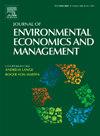The impact of air conditioning on residential electricity consumption across world countries
IF 5.9
3区 经济学
Q1 BUSINESS
Journal of Environmental Economics and Management
Pub Date : 2025-02-04
DOI:10.1016/j.jeem.2025.103122
引用次数: 0
Abstract
We provide a first globally-relevant assessment of the electricity consumption consequences of households’ adaptation to ambient heat through air conditioning (AC). We use household survey data from 25 countries within a discrete-continuous choice empirical framework to model households’ joint air conditioning adoption and utilization decisions, and combine the estimated responses with scenarios of socioeconomic, demographic, and climatic change to project air conditioning prevalence and cooling electricity demand circa mid-century. We find that air conditioning ownership increases households’ electricity consumption by 36%, on average, but the effect is heterogeneous, varying with weather conditions, income and country contexts, revealing the importance of behaviors, practices, climate, and technologies. Compared to the other drivers of electricity consumption, air conditioning has the leading marginal effect, also accounting for a significant share of household budgets. By 2050, the overall effect is a net increase in global yearly residential cooling electricity to 976–1393 TWh, with an additional 670–956 Mt of CO emissions, and associated social costs of $124–177 billion. Our findings highlight cooling energy expenditure as an emerging indicator of energy poverty as the climate warms, and provide an initial quantification of the economic and environmental risks associated with air conditioning as an adaptation to climate change.
空调对世界各国住宅用电量的影响
我们提供了家庭通过空调(AC)适应环境热量的电力消耗后果的第一个全球相关评估。我们在离散-连续选择经验框架中使用来自25个国家的家庭调查数据来模拟家庭联合空调采用和利用决策,并将估计的响应与社会经济、人口和气候变化情景相结合,以预测本世纪中叶左右的空调普及率和制冷电力需求。我们发现,拥有空调平均使家庭用电量增加36%,但影响是异质性的,因天气条件、收入和国家背景而异,揭示了行为、实践、气候和技术的重要性。与电力消耗的其他驱动因素相比,空调具有领先的边际效应,也占家庭预算的很大份额。到2050年,总体影响是全球每年住宅制冷电力净增加到976-1393太瓦时,二氧化碳排放量增加6.7 - 9.56亿吨,相关社会成本为1240 - 1770亿美元。我们的研究结果强调,随着气候变暖,制冷能源消耗作为能源贫困的一个新兴指标,并提供了与空调作为一种适应气候变化的手段相关的经济和环境风险的初步量化。
本文章由计算机程序翻译,如有差异,请以英文原文为准。
求助全文
约1分钟内获得全文
求助全文
来源期刊
CiteScore
8.00
自引率
4.30%
发文量
91
期刊介绍:
The Journal of Environmental Economics and Management publishes theoretical and empirical papers devoted to specific natural resources and environmental issues. For consideration, papers should (1) contain a substantial element embodying the linkage between economic systems and environmental and natural resources systems or (2) be of substantial importance in understanding the management and/or social control of the economy in its relations with the natural environment. Although the general orientation of the journal is toward economics, interdisciplinary papers by researchers in other fields of interest to resource and environmental economists will be welcomed.

 求助内容:
求助内容: 应助结果提醒方式:
应助结果提醒方式:


